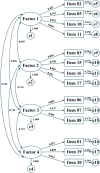Psychometric properties of the Arabic version of the Intuitive Eating Scale-2 (IES-2) in a sample of community adults
- PMID: 37005688
- PMCID: PMC10067204
- DOI: 10.1186/s40337-023-00782-3
Psychometric properties of the Arabic version of the Intuitive Eating Scale-2 (IES-2) in a sample of community adults
Abstract
Background: There is a growing attention on intuitive eating (IE) styles in the Western world that has not yet reached Arab countries, which is likely due to the lack of psychometrically sound measures of the IE construct for Arabic-speaking people. The current study aims to examine the psychometric properties of an Arabic translation of the most widely used measure of IE-the Intuitive Eating Scale-2 (IES-2), in an Arabic-speaking community population from Lebanon.
Methods: Two samples of Arabic-speaking community adults from Lebanon (sample 1: n = 359, 59.9% females, age 22.75 ± 7.04 years; sample 2: n = 444, 72.7% females, age 27.25 ± 9.53 years) were recruited through online convenience sampling. The translation and back-translation method was applied to the IES-2 for linguistic validation. Factorial validity was investigated using an Exploratory Factor Analysis & Confirmatory Factor Analysis strategy. Composite reliability and sex invariance were examined. We also tested convergent and criterion-related validity through correlations with other theoretically plausible constructs.
Results: Nine out of the original 23 items were removed because they either loaded below 0.40 and/or cross-loaded too highly on multiple factors. This resulted in four domains (Unconditional Permission to Eat, Eating for Physical Rather than Emotional Reasons, Reliance on Hunger and Satiety Cues, and Body-Food Choice Congruence) and 14 items retained. Internal reliability estimates were excellent, with McDonald's ω values ranging from 0.828 to 0.923 for the four factors. Multigroup analysis established configural, thresholds, metric, scalar, strict invariance across gender. Finally, higher IES-2 total scores were significantly correlated with lower body dissatisfaction scores and more positive eating attitudes, thus attesting to convergent and criterion-related validity of the scale.
Conclusions: The current findings provide preliminary evidence for the appropriate psychometric qualities of the Arabic 14-item, four-factor structure IES-2; thereby supporting its use at least among Arabic-speaking community adults.
Keywords: Arabic; IES-2; Intuitive eating; Psychometric properties; Validation.
Plain language summary
Diet restriction has proven costly and ineffective in promoting long-term weight loss. As an alternative, innovative behavioral approaches have been proposed, such as intuitive eating (IE) practices. IE focuses on enhancing intrinsic motivation for eating healthily, thus creating effective, sustainable lifestyle changes. The Intuitive Eating Scale-2 (IES-2) is the most widely used measure to assess IE in patients and the general population. This scale explores four components of IE: Unconditional Permission to Eat (i.e., not trying to stave off hunger and refusing to label certain foods as forbidden), Eating for Physical Rather than Emotional Reasons (i.e., eating when physically hungry rather than for emotional reasons), Reliance on Hunger and Satiety Cues (i.e., trusting one’s own internal satiety and hunger cues and relying on them to guide eating behaviors), and Body-Food Choice Congruence (i.e., the extent to which individuals make food choices that promote their body functioning and performance). Since its development, the IES-2 has been translated into different languages and validated in different countries and populations. However, no Arabic version of the IES-2 is yet available. We proposed in the current study to examine the psychometric properties of an Arabic translation of the IES-2 in an Arabic-speaking community population from Lebanon. Findings provided preliminary evidence for the appropriate psychometric qualities of the Arabic IES-2; thereby supporting its use at least among Arabic-speaking community adults.
© 2023. The Author(s).
Conflict of interest statement
The authors have no competing interests to report.
Figures
Similar articles
-
Polish Adaptation and Validation of the Intuitive (IES-2) and Mindful (MES) Eating Scales-The Relationship of the Concepts with Healthy and Unhealthy Food Intake (a Cross-Sectional Study).Nutrients. 2022 Mar 6;14(5):1109. doi: 10.3390/nu14051109. Nutrients. 2022. PMID: 35268085 Free PMC article.
-
Cross-cultural validity of the Intuitive Eating Scale-2. Psychometric evaluation in a sample of the general French population.Appetite. 2015 Jan;84:34-42. doi: 10.1016/j.appet.2014.09.009. Epub 2014 Sep 17. Appetite. 2015. PMID: 25239401
-
Psychometric properties of an Arabic translation of the Nine Item Avoidant/Restrictive Food Intake Disorder Screen (NIAS) in a community sample of adults.J Eat Disord. 2023 Aug 23;11(1):143. doi: 10.1186/s40337-023-00874-0. J Eat Disord. 2023. PMID: 37612764 Free PMC article.
-
Association of Parent and Child Intuitive Eating: A Scoping Review.Am J Lifestyle Med. 2024 Sep 6:15598276241279223. doi: 10.1177/15598276241279223. Online ahead of print. Am J Lifestyle Med. 2024. PMID: 39554935 Free PMC article. Review.
-
Mindful eating and eating behaviours in Greece: exploring the validity and reliability of two mindful eating scales and other eating behaviours for Greek-speaking populations.Eat Weight Disord. 2023 Oct 21;28(1):85. doi: 10.1007/s40519-023-01615-7. Eat Weight Disord. 2023. PMID: 37864641 Free PMC article. Review.
Cited by
-
The Intuitive Eating Scale-2 Adapted for Mexican Pregnant Women: Psychometric Properties and Influence of Sociodemographic Variables.Nutrients. 2023 Nov 19;15(22):4837. doi: 10.3390/nu15224837. Nutrients. 2023. PMID: 38004230 Free PMC article.
-
A multi-country examination of the relationship between perfectionism and disordered eating: the indirect effect of obsessive beliefs and obsessive-compulsive symptoms.J Eat Disord. 2024 May 31;12(1):69. doi: 10.1186/s40337-024-01030-y. J Eat Disord. 2024. PMID: 38822447 Free PMC article.
-
Psychometric properties of the Arabic emotional and behavioral reaction to intrusions questionnaire among sample of Arabic speaking adults.Sci Rep. 2025 Feb 8;15(1):4728. doi: 10.1038/s41598-025-86786-2. Sci Rep. 2025. PMID: 39922846 Free PMC article.
-
Assessment of intuitive eating in Saudi Arabia and its relationship with sociodemographic factors and nutritional indicators using an Arabic version of the Intuitive Eating Scale-2.Front Nutr. 2025 Jun 10;12:1585856. doi: 10.3389/fnut.2025.1585856. eCollection 2025. Front Nutr. 2025. PMID: 40557241 Free PMC article.
-
Intuitive Eating Scale-2 for adolescents: Validity and reliability study in Turkish adolescents.Eur J Pediatr. 2025 Aug 21;184(9):566. doi: 10.1007/s00431-025-06412-1. Eur J Pediatr. 2025. PMID: 40835794
References
LinkOut - more resources
Full Text Sources
Research Materials


